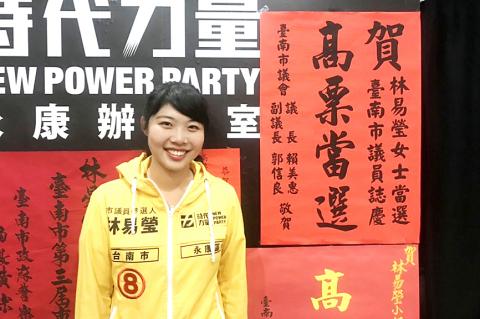The New Power Party (NPP) won 16 seats in Saturday’s city and county councilor elections, the biggest winner among minor parties and boosting its status as the third-largest party.
The NPP, which nominated 40 councilor candidates in 17 cities and counties, saw 40 percent of its candidates elected, gaining seats in Taipei, Taoyuan, Tainan, Kaohsiung, Keelung, Changhua County, Yunlin County, Miaoli County, Hsinchu City and Hsinchu County.
Founded in 2015 by civil activists associated with the 2014 Sunflower movement, the NPP became the third-largest party in 2016 after securing five seats in the Legislative Yuan. Saturday’s councilor elections were the first the party has participated in and its success was an indication of its growing influence.

Photo: CNA
The party had its greatest successes in Taipei and Hsinchu City, where it won three seats in each.
In Taipei, Legislator Freddy Lim (林昶佐) — who is also head of the party’s Taipei chapter — led a series of campaigns targeting supporters of Taipei Mayor Ko Wen-je (柯文哲) and had Ko as a guest at some events. In the nine-in-one elections, three of its five candidates won: Lin Liang-chun (林亮君), Lin Ying-meng (林穎孟) and Huang Yu-fen (黃郁芬).
However, in New Taipei City, where NPP Executive Chairman Huang Kuo-chang (黃國昌) led campaigning, all six of its candidates lost, including former star swimmer Tang Sheng-chieh (唐聖捷).
“Despite having limited resources, the candidates worked hard to research policies and plan their platforms. They did their best to lobby for support by visiting every neighborhood and speaking to people on the streets,” the NPP said in a statement yesterday.
“This was the first time the party took part in local elections. There is still room for improvement and we need to work harder,” it said, thanking supporters for giving its candidates a chance.
Two other minor parties bettered their previous performances.
The Social Democratic Party (SDP) nominated five candidates in Taipei, and while only Miao Po-ya (苗博雅) was elected, it was its first win in a local council since the party was founded in 2015.
That Miao could win a seat in Daan (大安) and Wenshan (文山) — districts typically dominated by conservatives — despite her unwavering stance on judicial reform and gender equality, shows that “voters can support a candidate with a resolute political stance” on such issues, SDP Convener Fan Yun (范雲) said on Saturday evening.
Meanwhile, the Green Party Taiwan won three seats, the most since its founding in 1996. Three of its 10 candidates were elected, including party convener and Taoyuan City Councilor Wang Hao-yu (王浩宇), who was seeking re-election.
“With limited resources, the party opted for a campaign style that was environmental and non-intrusive, giving short talks on streets and getting around on bikes,” Wang said, adding that most of its candidates lost due to their lack of wealth and political connections.
Other minor parties that won seats included the Taiwan Solidarity Union, the Republican Party and the Labor Party, winning five, three and two seats respectively, while the People First Party won eight and the New Party won two seats.

US President Donald Trump said "it’s up to" Chinese President Xi Jinping (習近平) what China does on Taiwan, but that he would be "very unhappy" with a change in the "status quo," the New York Times said in an interview published yesterday. Xi "considers it to be a part of China, and that’s up to him what he’s going to be doing," Trump told the newspaper on Wednesday. "But I’ve expressed to him that I would be very unhappy if he did that, and I don’t think he’ll do that," he added. "I hope he doesn’t do that." Trump made the comments in

NOT AN OPENING: Trump’s violation of international law does not affect China’s consideration in attacking Taiwan; Beijing lacks capability, not precedent, an official said Taiwanese officials see the US’ capture of the president of Venezuela as a powerful deterrent to Beijing’s aggression and a timely reminder of the US’ ability to defeat militaries equipped with Chinese-made weapons. The strikes that toppled Venezuelan President Nicolas Maduro signaled to authoritarian leaders, including Chinese President Xi Jinping (習近平), US President Donald Trump’s willingness to use military might for international affairs core to US interests, one senior official in Taipei’s security circle said. That reassured Taiwan, the person said. Taipei has also dismissed the idea that Trump’s apparent violation of international law could embolden Beijing, said the official, who was not

A cold surge advisory was today issued for 18 cities and counties across Taiwan, with temperatures of below 10°C forecast during the day and into tonight, the Central Weather Administration (CWA) said. New Taipei City, Taipei, Taoyuan and Hsinchu, Miaoli and Yilan counties are expected to experience sustained temperatures of 10°C or lower, the CWA said. Temperatures are likely to temporarily drop below 10°C in most other areas, except Taitung, Pingtung, Penghu and Lienchiang (Matsu) counties, CWA data showed. The cold weather is being caused by a strong continental cold air mass, combined with radiative cooling, a process in which heat escapes from

Snow this morning fell on Alishan for the first time in seven years, as a strong continental cold air mass sent temperatures plunging across Taiwan, the Central Weather Administration (CWA) said. The Alishan weather station, located at an elevation of about 2,200m in central Taiwan, recorded snowfall from 8:55am to 9:15am, when the temperature dropped to about 1°C, the CWA said. With increased moisture and low temperatures in the high-altitude Alishan area, the conditions were favorable for snow, CWA forecaster Tsai Yi-chi (蔡伊其) said. The last time snow fell at the Alishan weather station was on Jan. 10, 2018, while graupel fell there